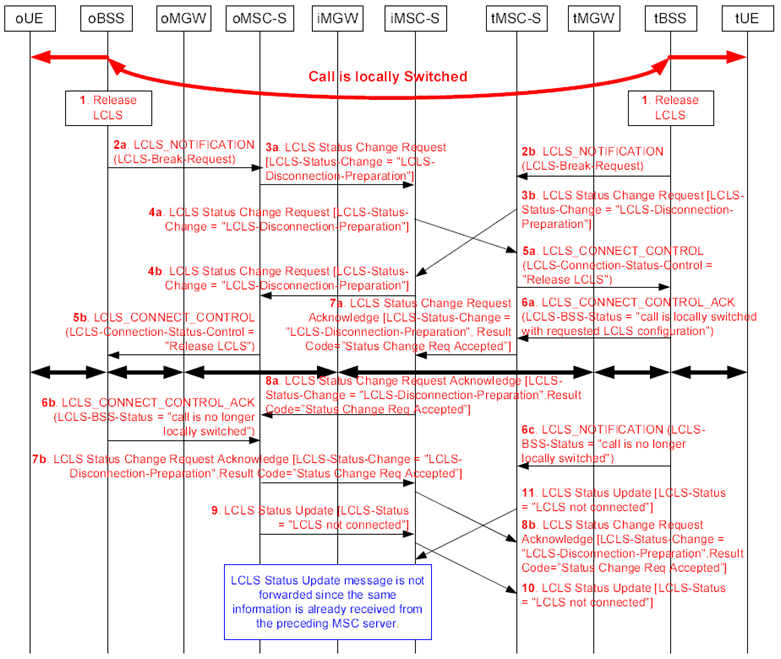Content for TS 23.284 Word version: 18.0.0
1…
4…
4.2…
4.3…
5
6…
6.3…
6.3.2
6.3.3
6.3.4
6.3.5
7…
7.2.4…
7.2.4.2
7.2.4.3
7.2.4.4
7.2.4.5
7.2.4.6
7.3…
7.3.4…
7.3.4.2
7.3.4.3
7.3.4.4
8…
8.2.3
8.3…
8.3.2
8.4…
8.4.1.1.7…
8.4.1.2…
8.4.2…
8.4.2.2…
8.4.5…
8.4.5.6
8.4.5.7
8.4.5.8…
9…
13…
13.4…
13.4.3…
13.4.4…
13.5…
13.6…
13.7…
14…
16…
A…
A.2…
7.2.4.4 BSS Initiated, LCLS Break requested from Core Network p. 53
Figure 7.2.4.4.1 shows the message sequence example for the BSS initiated but when the LCLS Break is requested from the Core Network.

Figure 7.2.4.4.1: BSS initiated, LCLS Release ordered from Core Network
(⇒ copy of original 3GPP image)
(⇒ copy of original 3GPP image)
Step 1.
The BSS determines that local switching should be disconnected.
Step 2a, b.
The BSS requests the LCLS disconnection by sending the LCLS-Notification message with LCLS-Break-Request IE set to "LCLS Break Request" to the oMSC server and tMSC server.
Step 3.
-
Step 4a, b.
- The oMSC server sends to the succeeding node the LCLS Status Change Request message with the LCLS-Status-Change IE set to "LCLS-Disconnection-Preparation".
- The tMSC server sends to the preceding node the LCLS Status Change Request message with the LCLS-Status-Change IE set to "LCLS-Disconnection-Preparation".
The iMSC server transfers the LCLS Status Change Request message to the succeeding/preceding node.
Step 5.
-
Step 6.
- The tMSC server sends to the tBSS the LCLS-Connect-Control message with the LCLS-Connection-Status-Control IE set to "Release LCLS".
- The oMSC server sends to the oBSS the LCLS-Connect-Control message with the LCLS-Connection-Status-Control IE set to "Release LCLS".
-
Step 7.
- The tBSS confirms the reception of the LCLS release request with the LCLS-Connect-Control Acknowledge message but does not change the LCLS-BSS status since LCLS release request is not yet received for the associated call leg.
- The oBSS reports the LCLS disconnection by sending the LCLS-Connect-Control Acknowledge message with the LCLS-BSS-Status IE set to "the call is no longer locally switched" to the oMSC server.
- The tBSS reports the LCLS disconnection by sending the LCLS-Notification message with the LCLS-BSS-Status IE set to "the call is no longer locally switched to the tMSC server".
-
Step 8.
- On the receipt of the LCLS-Connect-Control Acknowledge message with the LCLS-BSS status still indicating local switching the tMSC server sends to the preceding node the LCLS Status Change Request Acknowledge message with the LCLS-Status-Change IE set to "LCLS-Disconnection-Preparation" and the Result code IE set to LCLS Status Change Request accepted.
- On the receipt of the LCLS-Connect-Control Acknowledge message the oMSC server sends to the succeeding node the LCLS Status Change Request Acknowledge message with the LCLS-Status-Change IE set to "LCLS-Disconnection-Preparation" and the Result code IE set to LCLS Status Change Request accepted.
-
Step 9.
- The iMSC server transfers the LCLS Status Change Request Acknowledge message to the preceding node.
- The iMSC server transfers the LCLS Status Change Request Acknowledge message to the succeeding node.
At reception of the LCLS-Connect-Control Acknowledge message indicating LCLS disconnection the oMSC server sends the LCLS Status Update message with the LCLS-Status IE set to "LCLS Not Connected" to the succeeding node.
Step 10.
The iMSC server transfers the LCLS Status Update message to the succeeding node.
Step 11.
On the receipt of the LCLS-Notification message indicating LCLS disconnection the tMSC server sends the LCLS Status Update message with the LCLS-Status IE set to "LCLS Not Connected" to the preceding node.